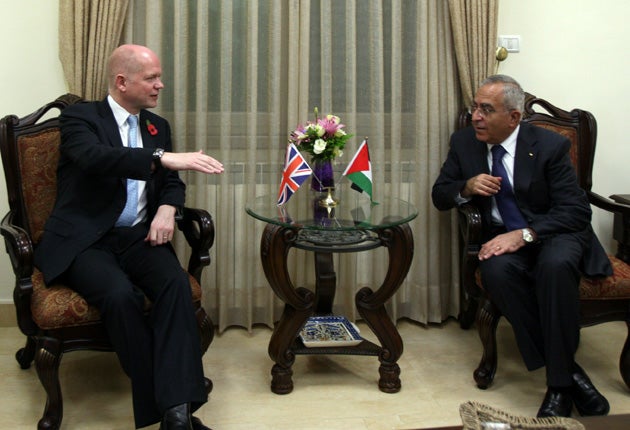Britain risks Israeli anger by extending diplomatic recognition to Palestinians
Hague's planned move increases pressure on Netanyahu government after latest round of US-sponsored talks collapse

Britain is expected to risk Israeli protests by upgrading the status of the Palestinians' diplomatic representation in London in response to the progress made in state-building preparations by its leadership in the West Bank.
Although the move would be symbolic rather than practical, it is being contemplated at a sensitive time because of deepening Israeli unease over Palestinian efforts to achieve international recognition ahead of negotiations or peace agreement.
Those efforts have gathered momentum in the wake of the United States' decision earlier this month to abandon efforts to persuade Israeli Prime Minister Benjamin Netanyahu to renew a moratorium on settlement-building in return for resuming direct negotiations between the two sides. Palestinian President Mahmoud Abbas insisted that he would not take part in such talks without a settlement freeze.
Ecuador last week became the latest of a series of Latin American countries – including Brazil and Argentina – to confer recognition of a Palestinian state within the borders that existed before the 1967 Six Day War. Israel regards such moves – which themselves have little practical significance – as helping to delude the Palestinian leadership into thinking it may be able to achieve a state without direct negotiations.
The British Government has no intention of following the Latin American example. Its upgrade to the Palestinian diplomatic presence comes after similar moves by France, Spain and Portugal since the summer. In July, the US upgraded the status of the Palestinian representation in Washington – though only up to "general delegation" level, which has long prevailed in most European countries, including Britain.
Although Israel did not formally protest any of these moves, it reacted sharply to the more recent decision of Norway to upgrade the Palestinian representative in Oslo earlier this month. The Norwegian chargé d'affairs was summoned for a "conversation" at the Foreign Ministry, despite making it clear that the move did not constitute recognition of a Palestinian state.
The move would have no practical impact on the day-to-day working of the Palestinian representative in London – currently Professor Manuel Hassassian. But it would probably allow the delegation to call itself a "mission", and would confer an automatic right of future representatives to call on the Foreign Secretary after their first arrival in the country.
But while the French upgrade provides for the Palestinian representative – officially of the Palestinian Liberation Organisation – to present his credentials to the President, the British move would not confer an equivalent right, enjoyed by ambassadors of actual states, to present credentials to the Queen.
Like the French decision, the British move would flow largely from a recognition that the Palestinian Cabinet, under the premiership of Salam Fayyad, has made considerable strides in public service and security reform as part of his two-year plan to prepare for a Palestinian state, and not from the recent impasse in negotiations.
When the French foreign minister Bernard Kouchner announced the upgrade in July, he went out of his way to point out that the Palestinians had "reorganised their administrations, made their public finances transparent, and have achieved unquestionable results with respect to security and respect for the rule of law".
Saying that France supported the creation of the "institutions of a future state", Mr Kouchner said it was "timely" to upgrade the Palestinian general delegation. The timing of any British move has been complicated by the heightened diplomatic atmosphere after the stalling of talks. Haaretz newspaper reported last week that the director general of the Foreign Ministry, Rafael Barak, sent a cable to its embassies, alerting them to a diplomatic effort by the Palestinians, driven by the lack of progress in the peace process: seeking a UN resolution condemning settlements; winning international recognition of a Palestinian state based on 1967 borders; and seeking upgrades in diplomatic representation in Europe and elsewhere.
* A prominent left-wing Israeli activist Jonathan Pollak was sentenced to jail for three months and fined 1,500 shekels (£273) yesterday for taking part in a 2008 bicycle protest against the blockade of Gaza. The Association of Civil Rights in Israel said the sentence was an "extreme punishment" and raised suspicion that Pollak was "targeted to silence him and prevent him from partaking in acts of protest".
Subscribe to Independent Premium to bookmark this article
Want to bookmark your favourite articles and stories to read or reference later? Start your Independent Premium subscription today.

Join our commenting forum
Join thought-provoking conversations, follow other Independent readers and see their replies